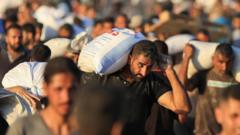Early this morning, Israel conducted a comprehensive strike on Iran's nuclear program, killing high-ranking officials and scientists, and raising concerns of escalating conflict. This strike is labeled as a pre-emptive measure to deter Iran's nuclear ambitions.
Israel Launches Major Offensive on Iran's Nuclear Infrastructure

Israel Launches Major Offensive on Iran's Nuclear Infrastructure
In a bold military move, Israel targets Iranian nuclear sites, heightening tensions in the Middle East.
In a dramatic escalation of military tensions in the Middle East, Israel initiated a significant offensive targeting dozens of Iranian locations, particularly its nuclear facilities, in a strike that occurred early this morning. This operation resulted in the deaths of key military figures and esteemed scientists linked to Iran's nuclear endeavors, prompting fears of a potential all-out war between Israel and Iran. Reports indicated that this assault marked the most extensive strike on Iranian soil since the Iran-Iraq war, which ended in 1989.
Israeli sources confirmed that the attacks effectively dismantled a considerable portion of Iran's leadership, with statements from Iranian media indicating the deaths of at least three high-ranking generals along with two notable nuclear experts. The assault also sadly claimed the lives of at least a dozen civilians, underscoring the strike's widespread and devastating impact.
Israeli officials characterized the action as a proactive measure designed to prevent Iran from attaining nuclear weapon capabilities. Israeli military leaders suggested that this operation was merely "the first stage" of an ongoing campaign. Prime Minister Benjamin Netanyahu reinforced the nation's stance, asserting that the offensive would persist "for as many days as it takes" to ensure national security.
The timing of the strikes coincided with recent actions by the United Nations nuclear watchdog, which had expressed concerns over Iran's compliance with international nonproliferation agreements. Just one day before the assault, there were scheduled talks between American and Iranian representatives set to take place in Oman, discussions that have now been thrown into uncertainty. U.S. officials distanced themselves from the operations, stating they were not involved.
In response to the strikes, Iran's supreme leader, Ayatollah Ali Khamenei, issued a dire warning to Israel, promising severe repercussions for the attack. Iranian military forces reportedly scrambled to intercept Israeli jets, with numerous air raid sirens sounding across Jerusalem and other major cities.
Eyewitness accounts from Tehran describe witnessing significant explosions, with state media showcasing dramatic footage of smoke and flames rising from the aftermath of the assaults. As the situation continues to develop, experts speculate it could take an extended period to fully assess the ramifications of Israel's actions on Iran's nuclear capabilities and overall military structure.




















